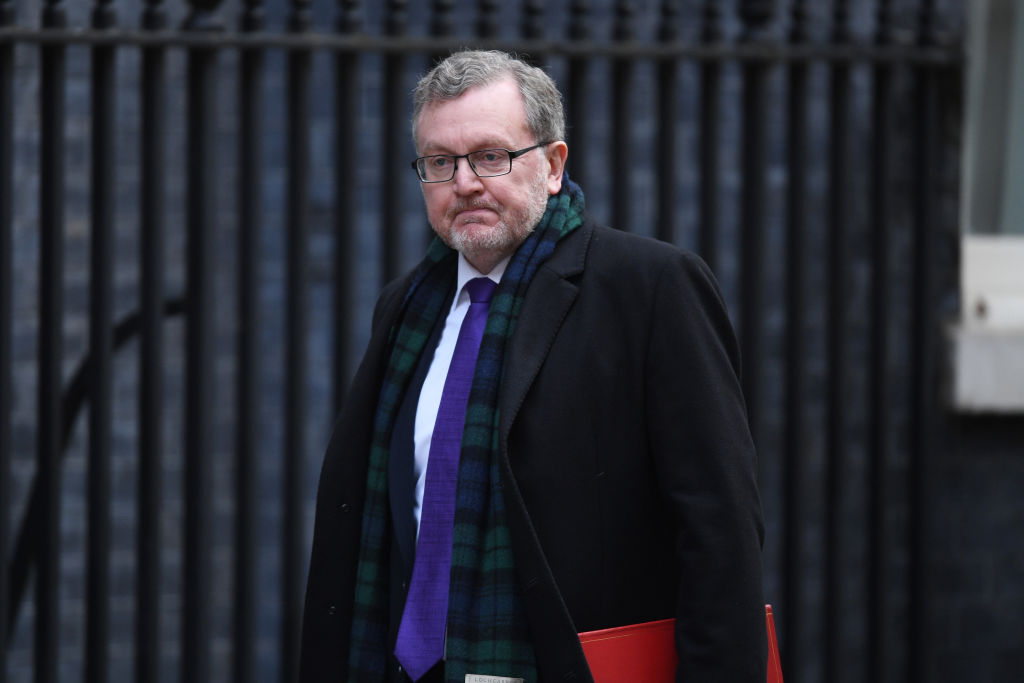The sacking of David Mundell as Scottish Secretary has left Ruth Davidson’s Tories reeling. The response is not tribal or even ideological; Brexiteers and Remainers alike regard his replacement Alister Jack as a good sort. What most are still struggling to fathom is the thinking behind Mundell’s punting. Of course, he is an opponent of no deal — Jack, by contrast, has taken the pledge and says he could support a crash-out Brexit — but he was seen as hard-working and effective in the Scotland Office. He knew the brief, had the experience and was well-briefed in the tactics of the SNP.
Scottish Tories are so unsettled by the move, I’m told, because Mundell had a more direct hand in the revival of the party north of the border than has hitherto been appreciated. A senior party source tells me:
‘It seems ironic that without David Mundell, there would never have been 13 Scottish MPs returned in 2017 and without the Scottish MPs, Jeremy Corbyn would already be in Downing Street. So, basically, there would not be a Conservative government for Boris Johnson to lead without David Mundell’s efforts and successes. Mundell is properly strategic, and Boris treating him dismissively could prove to be a real error.’
Davidson’s relationship with Mundell pre-dates even her election as an MSP. In 2010, when she was on a hiding to nothing as the Tory candidate in Glasgow North East, ex-BBC journalist Davidson volunteered to help Mundell with TV debate prep as well as some general bag carrying. This was not glamorous stuff: at one point, she found herself in the car park of a 24-hour Asda in Dumbarton, sewing kit in hand, after the shadow Scottish Secretary ripped his trousers en route to a campaign event.
It was here — the campaign trail, not the car park — where Davidson came to value Mundell’s skill as a strategist and an organiser. When she became leader the following year, she immediately sacked party chairman Andrew Fulton — David Cameron found out when he called to congratulate her — and installed Mundell as interim chair. In fact, it was a front for Mundell to head up a small group of trusted allies tasked with steamrollering through a modernisation agenda. Mundell and Davidson hired a hotel suite outside Edinburgh and gathered party director Lord McInnes, future Berwickshire MP John Lamont and long-time activist Kevin Ancell. Over the next 48 hours, the quintet planned the resurrection of the Scottish Tory Party, which they assumed would take ten years rather than the five Davidson actually needed.
Mundell led the quintet behind the scenes for the next two years, on top of his duties as a Scotland Office minister. My source, who is a close ally of Davidson, says many of the ideas for which she has been given credit were actually the brainchild of the man she likes to call her ‘work husband’.
It was Mundell who thought up Conservative Friends of the Union, a group that allowed the party to reach 80,000 non-members, recruit Labour supporters and raise hard cash. I understand Davidson refers to him privately as a ‘co-architect’ of her rejuvenation of the Scottish Tories. Their relationship is so close that a source tells me Davidson asked and Mundell agreed to officiate a civil wedding between her and partner Jen if the Church of Scotland still isn’t conducting same-sex ceremonies when the time comes.
My insider adds:
‘Ruth and David are properly close… Ruth’s core team is actually a pretty small group of trusted individuals. David has always been part of it. He was the one that persuaded Ruth to stand for the leadership when she thought she was too new and too green and he’s been part of the core team ever since. You talk about people “in the room” when decisions get made, David has been in the room with Ruth for every important decision, every campaign plan, every polling report and every major change as she overhauled a creaking and failing party and turned it into one that could win seats and advance across Scotland. They are very different people and often come at things from different angles but they never brief against each other, never allow any disagreement to go public and genuinely have each other’s backs both within the party and against the world.’
Given all this, it’s not surprising to learn that Davidson spoke directly to Boris after his victory and lobbied him to keep Mundell in place until any replacement could gain ministerial experience. What is harder to reconcile is that a new Tory leader, who polls in Scotland somewhere south of Freddy Krueger, who has basically no working relationship with the Scottish Tory leader, would snub her first request to him as Prime Minister.
In sacking Mundell in the brutal way he has, rather than the staged transition she is understood to have recommended, Boris has sent two troubling signals to Scottish Tories, including those who support him: 1) he doesn’t understand how Scottish politics works, and 2) he doesn’t care. It’s a first impression that could last if he doesn’t correct it.







Comments